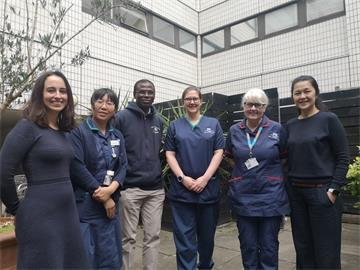Recipients of BRC doctoral funding present PhD projects

Six Oxford University Hospitals (OUH) nurses and allied health professionals who have received funding from NIHR Oxford Biomedical Research Centre (BRC) have presented their PhD projects to their fellow awardees and supervisors.
The BRC provides up to £10,000 for the year to give the recipients protected time away from their clinical work to work on their studies, for example collecting or analysing data, or writing up their thesis. The funding then allows their clinical role to be backfilled.
The doctoral award is just one of several steps on the clinical academic pathway that the Oxford BRC supports for nurses, midwives and allied health professionals, pharmacists and healthcare scientists (NMAHPPS) at OUH.
Dr Louise Strickland, OUH Deputy Director of Nursing and Midwifery Research and Innovation, said: "This terrific scheme from the BRC supports doctoral NMAHPPS who have a real struggle when they're working full time and trying to juggle their study along with clinical practice. Some get no study time or support."
The six BRC award recipients presenting their research projects were:
- Lian Lee, Deputy Matron in Churchill Hospital theatres, whose project is on nurses' communications experience in robotic-assisted surgery.
- Carol Forde-Johnston, Divisional Recruitment and Retention Nurse Lead, whose study is on the quality of nurse-patient interactions when electronic patient records systems are used.
- Francesca Tabacchi, Specialist Oncology Dietitian, whose research looks at malnutrition and nutritional support in lung cancer and gynaecological cancer patients undergoing chemotherapy. Read a profile of Francesca.
- Yuhan Zhang, Advanced Nurse Practitioner in the Ambulatory Outreach Team, who is looking at nurses' decision-making in remote review. Read more about Yuhan.
- Rachel Lee, Senior Specialist Nurse in the Palliative Care Team, whose project concerns advanced care planning for Parkinson's disease patients.
- Anthony Afanu, Practice, Education and Development Lead Nurse for the Oxford Eye Hospital, Doctor of Education research focuses on how to support the self-directed learning of international nurses in higher education. Read a profile about Anthony.
Carol, who has just started the fifth and final year of her PhD in nursing at Oxford Brookes University, said: "The support from the BRC has been amazing. It has helped me in so many different ways. My fees were supported and last September I was awarded funding that enabled me to go on a sabbatical for three months. Someone was seconded into my current role and that enabled me to have study time to write up my PhD. It allowed me to break the back of my thesis. I was really grateful for it because it's very difficult to get study leave."
Lian received her BRC funding in late 2022, having started her PhD part-time and fully self-funded in 2019. "That award changed my whole research landscape," she said. "I had dedicated time away from clinical work to analyse the data. At the same time the funding is a secondment opportunity for a band 7 colleague to do a quality improvement project."
Like other projects, her interest in robotic surgery seeks to highlight the key contribution nurses need to make in advances in healthcare: "From my governance perspective, as a matron, it's within my professional responsibility as we advance towards AI technology and robotic surgery to bring the nurses' voice into building a stronger safety culture in healthcare – that's the whole purpose of my research."
Dr Strickland added: "It's been wonderful to see the remarkable breadth of the projects – from robotic surgery to how we do our documentation and improve patient interactions. It all goes to improve patient care, and to increase the capacity and capability of the NMAHPPS workforce.
"At OUH, we're a world leader in research and we're a world leader in patient care and it's important that we support one of the major workforces within the trust. We have 6,500 NMAHPPS staff and the Council of Deans has an objective for about 1% of them to be clinical academics by 2030. The BRC has helped with some of the groundwork by supporting the infrastructure across that clinical academic pathway from dipping your toe in with an internship through to doctoral and post-doctoral support."
She added: "The evidence shows that research-active trusts have better patient outcomes, there's better patient education and better staff retention. Being able to develop and support our staff is an important part of that, and this is just one of the ways that the BRC has been pivotal in supporting the NMAHPPS Research and Innovation Leadership Team as we develop and grow our staff."
Pictured: The six BRC award recipients




























































